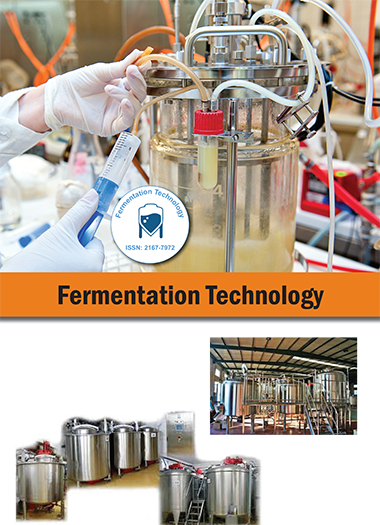ఇండెక్స్ చేయబడింది
- J గేట్ తెరవండి
- జెనామిక్స్ జర్నల్సీక్
- వ్యవసాయంలో గ్లోబల్ ఆన్లైన్ పరిశోధనకు యాక్సెస్ (AGORA)
- RefSeek
- హమ్దార్డ్ విశ్వవిద్యాలయం
- EBSCO AZ
- OCLC- వరల్డ్ క్యాట్
- పబ్లోన్స్
ఉపయోగకరమైన లింకులు
ఈ పేజీని భాగస్వామ్యం చేయండి
జర్నల్ ఫ్లైయర్

యాక్సెస్ జర్నల్స్ తెరవండి
- ఆహారం & పోషకాహారం
- ఇంజనీరింగ్
- ఇమ్యునాలజీ & మైక్రోబయాలజీ
- క్లినికల్ సైన్సెస్
- జనరల్ సైన్స్
- జెనెటిక్స్ & మాలిక్యులర్ బయాలజీ
- నర్సింగ్ & హెల్త్ కేర్
- న్యూరోసైన్స్ & సైకాలజీ
- పర్యావరణ శాస్త్రాలు
- ఫార్మాస్యూటికల్ సైన్సెస్
- బయోఇన్ఫర్మేటిక్స్ & సిస్టమ్స్ బయాలజీ
- బయోకెమిస్ట్రీ
- మెటీరియల్స్ సైన్స్
- మెడికల్ సైన్సెస్
- రసాయన శాస్త్రం
- వెటర్నరీ సైన్సెస్
- వ్యవసాయం మరియు ఆక్వాకల్చర్
- వ్యాపార నిర్వహణ
నైరూప్య
Optimization of Biogas Production from Avocado Fruit Peel Wastes Codigestion with Animal Manure Collected from Juice Vending House in Gimbi Town, Ethiopia
Girmaye Kenasa and Ebsa Kena
Anaerobic bio digestion of fruit peel wastes is one of the potential for biogas production which subsequently reduces environmental pollution. In order to test the biogas potential of avocado fruit peel wastes co-digested with either cow dung or poultry manure, the raw materials were collected from juice vending house, dairy farm, and poultry farm, respectively. A finely grinded avocado fruit peel wastes was prepared for the different setups. The experiments include 100% avocado fruit peel wastes (T1), 100% poultry manure (T2), 100% cow dung (T3), 50% T1+50% T2 (T4), 50% T1+50% T3 (T5), 75% T1+25% T2 (T6) and 75% T1+25% T3 (T7). The total weight of the raw material was 100 g either solely or in mixture with the animal manure. 15 ml of rumen fluid collected from slaughterhouse was added into each treatment as inoculums. The total volume of the biodigesters was made 1800 ml by adding distilled water; and the setups were completely sealed in plastic bottles. The gas produced was estimated by water displacement method. Feedstocks containing both 100% poultry manure (T2) and 50% poultry manure (T4) attained maximum biogas production within 3-4 days of incubation. The highest in cumulative biogas was produced from the two treatments at 20thday. The optimum temperature, salt and pH for biogas production from the fruit wastes co-digested with animal manure were 25°C, 0.5% and 7 respectively. Under this environmental condition, the highest biogas (453.5 ± 0.5 mL) was produced by T6 that was significantly higher than the othertreatments. In general, the feed stock containing poultry manure co-digested with avocado fruit waste was fast and high in biogas generation. Therefore, co-digestion of avocado fruit peel waste with animal manure is a good strategy to produce bioenergy and minimize urban solid wastes discharge although it demands controlling some physical parameters.